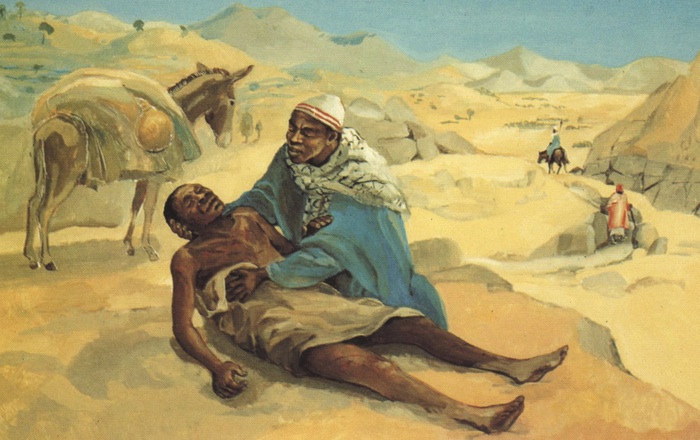Commentary on Luke 10:25-42
The lawyer who tests Jesus already knows the answer to his first question, “What must I do to inherit eternal life?”
By the time of his second question — “And who is my neighbor?” — one suspects confirmation bias to be in play. He already knows that answer, too. He is a smart guy, after all; it is his job to trade in certainty.
But Jesus turns the lawyer’s certainty on its head. Parables have a way of doing that.
The parable of the Good Samaritan is quite familiar, even in secular culture. Most U.S. states have laws in its name, making it possible for bystanders to help people in need without being placed at legal risk when they do so.
What is a preacher to do with a parable so familiar that “everybody” already knows what it means? One option is to recognize that our certainty places us squarely in the shoes of the lawyer whose questions prompted the parable in the first place. If Jesus’ story challenged his preconceived notions, we might create space for it to challenge our own.1
With the exception of a very brief addendum regarding Luke 10:38-45 (Mary and Martha), the following reflections offer entry points into a parable that readily lends itself (as parables tend to do) to multiple interpretations.
What must I do?
“What must I do (Greek: poiein) to inherit eternal life?” (Luke 10:25) The lawyer’s question echoes the crowds that gather around John the Baptist (Luke 3:10) and it is repeated by the rich young ruler (Luke 18:18). Each of these questioners wants something from God. It is almost as if people are looking for a checklist: first do this, then that, everything will be all right, and you will have won God’s mercy.
When Jesus answers with a question of his own, the lawyer demonstrates his knowledge of the Bible — he quotes from the Shema and the explication of the Decalogue (Deuteronomy 6:5; Leviticus 19:18). Readers of Luke might recall that the devil can quote scripture, too (Luke 4:1-12). Knowledge of the right words need not imply that one has a clue about the ways of God.
“Do this, and you will live (poiein, Luke 10:28),” answers Jesus, affirming those greatest commandments to love God and love neighbor. Go and do likewise” (poiein, 10:37), he says, after telling a story that leaves his questioner asking more questions.
Jesus offers a to-do list, but not one as simple or cut-and-dried as the lawyer (or we ourselves) might wish. Life is rarely subject to simple to-do lists. Nor is faithfulness.
And who is my neighbor?
The Hebrew scriptures command care for the most vulnerable, including the foreigner or immigrant: “You shall love the alien as yourself, for you were aliens in the land of Egypt” (Leviticus 19:34). Surely, the lawyer already knows this. Nonetheless, his second question (“And who is my neighbor?”) appears to place limits on his circle of concern (and, perhaps, on Jesus’ circle of concern). It is as if he were saying, “Yes, but of course you can’t mean those people are neighbors, right?”
If Jesus had told a parable with a Foreigner-Samaritan as the injured and vulnerable person and a Jewish Jesus-follower in the role of the helper, nobody would have batted an eyelash. Such a story would follow culturally expected scripts and would confirm the lawyer’s self-justification (see Luke 10:29).
But “culturally expected” is not how the parable plays out. Among those people (that is, folks-not-like-us) is one who turns out to be a hero. That reversal offers potential points of connection for preachers. If nothing else it suggests a significant difference between Jesus’ and the scripture-quoting lawyer’ views of these “others.”
The reversal also offers clues about God’s mercy (Luke 10:37), which often manifests itself to us in ways we do not expect. (Every other occurrence of mercy/heleos in Luke is in reference to God: 1:50, 54, 58, 72, 78.)
Vulnerability and fear
The traveler in Jesus’ story is in no position to do anything. There is no cell phone to call his friends, no roadside assistance from the local highway patrol. He is beaten and naked, vulnerable and alone. Afraid. No safety net.
He cannot save himself.
His situation contrasts that of the 70 whom Jesus had sent out at the beginning of chapter 10. Their vulnerability was voluntary– no purse, no bag, no sandals, no food except whatever is freely offered (Luke 10:1-7). The traveler has had all these things stripped from him against his will. In both cases, though, life hangs on the generosity of others and the graciousness of God.
Imagine hope crashing inside the battered traveler as the Priest and Levite pass by. Do we feel a sting of judgment in Jesus’ portrayal of these “spiritual-and-also-religious” representatives? Imagine the injured one saying to himself as he watches the foreigner approach, “Please, God, not him. Please-oh-please, send somebody else.”
A Culture of Fear
Jews and Samaritans shared historical roots, but their respective cultures and religious convictions had diverged over time. Conflict was not uncommon. In Luke 9:52-55, when a Samaritan village refuses to offer hospitality to Jesus, James and John want to respond with a heavenly firebomb. The impulse to destroy the other is not new, particularly in times of fear.
There was plenty for Jesus’ first followers to fear: eighteen people killed by a falling tower in Siloam (Luke 13:4); terrorist-zealots stirring up trouble in Jerusalem as well as in villages and towns in Galilee; a powerful government (Rome) deploying armies to maintain order, ensure payment of taxes, and control the populace.
Even without Facebook and Twitter, first-century folks would have known about protests against Roman governmental authorities and ethnic clashes between Gentiles and Jews. It is into this context of fearfulness that Jesus speaks a parable of vulnerability and compassion as elements of God’s mercy.
Addendum: [Very] brief ponderings about Mary and Martha
- Like the Samaritan (in contrast to the Samaritan village, 9:52ff) Martha offers hospitality to a traveler (Jesus).
- Like the lawyer, she seems to be concerned about doing the right things.
- Jesus challenges her perspective (as he challenges perspectives by his parable).
- Mary receives the gift of Jesus’ teaching – that is, she listens to his words – just as the traveler receives the gift of the Samaritan’s mercy.
Notes:
1 For a discussion of multiple interpretations of The Good Samaritan, see Richard Lischer, Reading the Parables, Interpretation: Resources for the Use of Scripture in the Church [Westminster John Knox: Louisville, 2014] 151-166.
PRAYER OF THE DAY
Compassionate God,
How easily you love those who look unlovable to us! How readily you welcome undesirables into your home! How slow we are to follow your example. Turn our hearts toward all who are considered outcast, shunned, and unclean so that we may love our neighbor without pity or apathy, for the sake of the one who became flesh to cleanse the world of sin and death forever, Jesus Christ our redeemer. Amen.
HYMNS
Jesus calls us; o’er the tumult ELW 696, H82 549, 550, UMH 398, NCH 171, 172
O God of mercy, God of light ELW 714
Spirit of God, descend upon my heart ELW 800, UMH 500, NCH 290
CHORAL
Spirit of God, descend upon my heart, Robert Buckley-Farlee


March 5, 2017